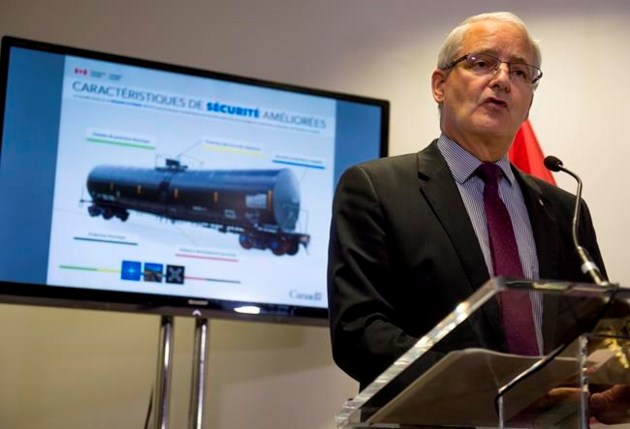Repost from Hazmat Magazine
Canada phasing out potentially dangerous rail tank cars ahead of schedule
By J Nicholson, August 19, 2016The Canadian federal government will retire the older DOT-111 rail tanker cars — the ones involved in the deadly Lac-Mégantic tragedy — several months earlier than planned. “Protective Direction 38” stipulates that the DOT-111 tanker cars will no longer be permitted to transport crude oil or other dangerous goods on Canadian railways as of November 1st 2016. The original phase out plan called for the tanker cars to be phased out by May of 2017.

The DOT 111 rail tanker cars do not have a layer of thermal protection. Experts speculate that the Lac-Mégantic rail derailment would not have been as disastrous if the runaway freight train did not have DOT 111 tanker cars. On July 6th 2013, a runaway freight train pulling 72 tanker cars of crude oil exploded in the downtown area of Lac-Mégantic, killing 47 people.
The new standard tanker rail car is the TC-117. It has a thicker steel hull, thermal protection, a full head shield, protective valve covers and a bottom outlet valve for safety. Rail experts say the TC-117 is much more able to resist puncture than the DOT 111.
DOT 111 will still be able to be used by rail companies; however they are not permitted to be used for the transport of dangerous materials such as crude oil.
There are skeptics to the phase out rules on the old rail cars. Mike Benson , the Fire Chief for the northern Ontario community of Gogama, told the Timminspress.com that he is skeptical that the redesign of rail cars, on their own, will ensure safety in his community.
“It’s a good step but a very small step. But the problem isn’t so much the makeup of the cars as it is the maintenance and inspection of the track,” said the fire chief. “All the difference with the new cars is another quarter-inch of steel on either end of the car. These things contain 100,000 litres weighing a million pounds, so it’s not going to change anything if there’s a derailment.”
A more effective policy, said Benson, would be taking steps to prevent similar derailments from happening in the future. That would mean significantly increasing the amount of track maintenance and inspection and decreasing the speed limit for trains in rural areas.
“The companies don’t want to slow their trains down … but with four derailments in three years, I’d say there’s a bit of a problem there,” said Benson.
The Railway Association of Canada is in favour of the move made by the federal government to phase out the tanker cars. Michael Bourque, a spokesperson for the Association stated, “Removing this tank car model from service sooner is an effective step toward ensuring the safe transportation of dangerous goods in Canada. We welcomed harmonized Canada-U.S. tank car standards introduced last year, and we’re equally pleased with the announcement.”
The use of rail cars to transport oil has soared in Canada over the past few years. In 2015, there were 146,000 shipments of crude oil across Canada.


